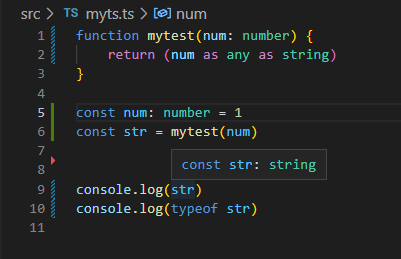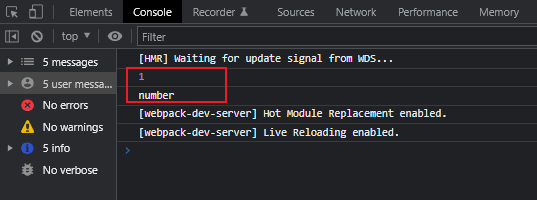

攀爬TS之路(五) 类型断言
source link: https://www.clzczh.top/2022/06/18/typescript-5/
Go to the source link to view the article. You can view the picture content, updated content and better typesetting reading experience. If the link is broken, please click the button below to view the snapshot at that time.
攀爬TS之路(五) 类型断言
第二段路时,已经提到联合类型:变量只能访问联合类型中所有类型共有的属性或方法
语法:值 as 类型 或 <类型>值
将联合类型断言成其中的具体类型
interface IFishman {
// 摸鱼人
name: string,
play(): void
}
interface IWorker {
// 干饭人
name: string
eat(): void
}
function myFunc(person: IFishman | IWorker) {
console.log(person.name)
person.play() // 报错:类型“IFishman | IWorker”上不存在属性“play”。类型“IWorker”上不存在属性“play”。
}
但是,有时候我们就是需要访问非公有的属性或方法。比如上面的例子中,当是Fishman时,调用play方法,当是Worker时,调用eat方法。
这时候,断言就能用来将联合类型断言成其中的具体类型。
interface IFishman {
// 摸鱼人
name: string,
play(): void
}
interface IWorker {
// 干饭人
name: string,
eat(): void
}
function myFunc(person: IFishman | IWorker) {
(person as IFishman).play() // 将person断言成IFishman
}
const fishman: IFishman = {
name: 'clz',
play: function () {
console.log('摸鱼')
}
}
myFunc(fishman) // 摸鱼
乍一看,挺好的,但是,实际上只是隐藏其他情况而已,比如上面person as IFishman隐藏了person为IWorker的情况,这时候如果传入的参数是IWorker类型的,那就会报错,而且没法在编译阶段就暴露错误
const worker: IWorker = {
name: 'clz',
eat: function () {
console.log('干饭')
}
}
myFunc(worker)
所以,使用断言时,应该非常注意,不然会增加一些运行时错误
将父类断言成更具体的子类
更准确来说,是将父类型断言成更具体的子类型,因为类的话,使用instanceof来判断就足够了。
但是,如果我们使用接口的话,它并不是类,而是类型,自然就不能使用instanceof来判断,这时候就需要使用断言来将父类型断言成更具体的子类型(实际上和将联合类型断言成其中的具体类型很像)
class Person {
name: string
}
interface IFishman extends Person {
// 摸鱼人
play(): void
}
interface IWorker extends Person {
// 干饭人
eat(): void
}
function myFunc(person: Person) {
// console.log(person instanceof IFishman) // 会报错:“IFishman”仅表示类型,但在此处却作为值使用。
if (typeof (person as IFishman).play === 'function') {
return '摸鱼人'
} else if (typeof (person as IWorker).eat === 'function') {
return '干饭人'
}
}
const worker: IWorker = {
name: 'clz',
eat: function () { }
}
console.log(myFunc(worker)) // 干饭人
将任何一个类型断言成any
我们使用JS进行开发时,有时候可以在window对象上添加新的属性,这个属性就能够全局访问了,但是,在TS中是会报错的,因为window对象没有该属性,就会报错。
但是,这个做法实际上在开发中能够很便利,这个时候可以使用断言将它断言成any类型,这样子就能够添加新属性了。
(window as any).a = 123
需要注意的是,这样可能会掩盖真正的类型错误
将any断言成具体类型
设想一个情境,一个获取两个参数的和的函数,返回值按理应该是number类型,但是,结果却是any类型,这样子就会导致很多能在编译阶段暴露出的错误没法暴露出来。(这个情境是随便想的,简单来讲就是,历史代码不太好动,可能会引发蝴蝶效应)
function mySum(a: number, b: number): any {
return a + b
}
const sum = mySum(9, 8)
console.log(sum.length)
比如上面,我们应该在访问sum.length时报错才对,但是因为是任意类型,所以不会报错,所以这时候就可能使用断言,将any断言成具体的类型,恢复它的在编译阶段报错的功能。
如果A兼容B或者B兼容A,那么A能够被断言为B。
这里的兼容简单来说就是:A兼容B就是指类型A是类型B的子集。
class Person {
name: string
}
interface IFishman extends Person {
// 摸鱼人
play(): void
}
function testPerson(person: Person) {
return (person as IFishman)
}
function testIFishman(fishman: IFishman) {
return (fishman as Person)
}
上面的例子中,类型Person是类型IFishman的子集,即Person兼容IFishman,所以Person能被断言为IFishman,IFishman也能被断言为Person。
上面使用的Person是类,而IFishman是继承了Person,所以可能会误以为是继承关系导致的能否被断言。实际上,断言并不是根据是否有继承关系,而是看有没有兼容关系。所以下面的做法也是可以的。
interface IPerson {
name: string
}
interface IFishman {
// 摸鱼人
name: string,
play(): void
}
function testPerson(person: IPerson) {
return (person as IFishman)
}
function testIFishman(fishman: IFishman) {
return (fishman as IPerson)
}
如果类型A不兼容B,并且类型B不兼容A,那么A不能断言为B,B也不能断言为A。
比如number和string。
禁术:双重断言
- 任何类型都可以被断言成
any any可以被断言成任何类型
所以,可以使用禁术双重断言把任何一个类型断言成任何另一个类型。
function mytest(num: number) {
return (num as any as string)
}
除非迫不得已,千万别用双重断言。禁术:伤敌一千,自损八百
类型断言不会进行类型转换
类型断言只在TS编译时有效果,在编译结果中会被删除,不会影响到编译结果的类型。

这个例子中,乍一看,断言还同时实现了类型的转换。
但是,都是假象。编译结果,立马打回原形。

所以,需要进行类型转换还是得老老实实直接调用类型转换的方法。
function mytest(num: number) {
return String(num)
}
const num: number = 1
const str = mytest(num)
console.log(str)
console.log(typeof str)
类型断言VS类型声明
function mytest(num: number): any {
return num
}
const num = mytest(123) as number
console.log(typeof num)
我们可以使用断言将any类型断言为number类型。
当然我们也可以使用类型声明的方式来实现。
const num: number = mytest(123)
这么一看,结果几乎是一样的。
实际上,类型声明的使用会比类型断言要更严格,所以使用类型断言很可能会导致一些隐藏问题。
先来看看,类型断言和类型声明的核心区别:
- A断言为B:需要满足A兼容B,或者B兼容A
- A赋值给B:只有满足B兼容A才行
interface IPerson {
name: string
}
interface IFishman {
// 摸鱼人
name: string,
play(): void
}
const person: IPerson = {
name: 'clz'
}
const fishman = person as IFishman
上面的断言:person兼容IFishman,所以IPerson类型能断言为IFishman类型,不过会有一些隐藏问题,比如IFishman
类型原本是需要有play方法的,但是用断言就直接出现了一个没有play方法的IFishman。
使用类型声明会更严格,但是也能够避免一些隐藏错误。
const fishman: IFishman = person
Recommend
About Joyk
Aggregate valuable and interesting links.
Joyk means Joy of geeK